Official Says Iran Losing Iraqi Energy Market To Saudi Arabia
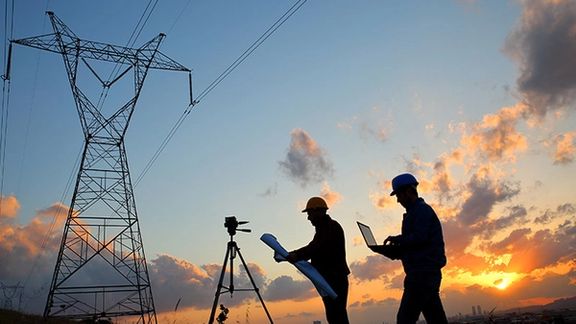
An Iranian official says the Islamic Republic is losing the lucrative Iraqi energy market to Saudi Arabia.

An Iranian official says the Islamic Republic is losing the lucrative Iraqi energy market to Saudi Arabia.
Hamid-Reza Salehi, a member of Iran’s Chamber of Commerce, told ILNA on Wednesday that the reason Iran is losing the $20 to $30 billion market is the government’s views about the private sector.
He added the administration wants to keep the electricity exports to Iraq at a minimum level because it cannot get its money due to sanctions, noting that Saudi Arabia and Egypt are replacing Iran there.
Salehi said that if the government had the right approach about the private sector, it would use its blocked assets in Iraq to help private companies expand their activities there.
Saudi Arabia and Iraq signed a memorandumof understanding on January 25 to connect their electricity grids, which can supply much-needed power to Iraq.
Baghdad relies heavily on Iranian electricity imports, while in addition, one third of its electricity comes from thermal power plants which use Iranian natural gas. However, during the last few years, Iran has always cut gas exports in winters and curbs electricity deliveries in summers due to its own domestic shortages.
Moreover, Egypt -- that produces an electricity surplus estimated at between 26 and 38,000 megawatts according to Sky News Arabia -- agreed in July 2021 to supply 700 megawatts of electricity to Iraq through expanding its power interconnection with Jordan.
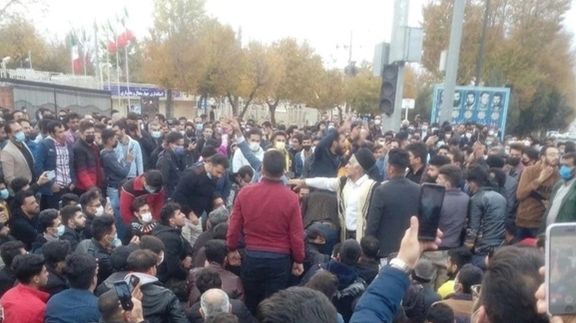
Discontent in Iran has tripled in a year according to what hackers say are the "top secret" minutes of a Revolutionary Guards (IRGC) taskforce meeting.
Radio Farda, a United States-funded station and based in the Czech Republic, reported Tuesday it had been given the “highly confidential” document by the ‘Edalat-e Ali’ group and published an account, the day after the group hacked live streaming on the website of Iranian state television.
Edalat-e Ali released the document on Twitter Wednesday, saying the minutes were from a November meeting of IRGC's ‘Livelihood-Based Security Crises Prevention Taskforce.’ They record an intelligence official, whose surname is given as Mohammadi, citing a survey that social discontent had increased by 300 percent in the previous year. "The society is boiling over and may explode,” the official reportedly said.
The hackers said the meeting took place at the IRGC Sarallah Headquarters, responsible for the security of Tehran, on November 21 with representatives of various bodies including the Tehran Prosecutor's Office, the intelligence ministry, police, and IRGC intelligence.
The minutes recorded Mohammadi saying that "several shocks” − including a fall in the stock market prices – had led Iranians to doubt the ability of President Ebrahim Raisi's government, which took office in August, to improve the situation and warned that protests were taking place over high inflation, delays in paying wages, and water shortage.
A police officer, ‘Colonel Kaviani,’ said that since the beginning of the Iranian calendar year on March 21 there had been a year-on-year increase of 48 percent in protest rallies with a 98 percent increase in participants, mainly in front of the parliament and the ministry of labor. He predicted a 22 percent increase in protests in subsequent months.
In the past few months many Iranian media and politicians have warned that economic pressures may lead to social upheavals. Chief Justice Gholam-Hossein Mohseni Ejei said Monday, according to the IRGC-linked Javan newspaper, that people might lose trust in politics "if they see that social justice is diminishing."
Funeral of the Islamic Republic
Ahmad Naderi, a conservative member of parliament, on January 30 blamed the previous administration of President Hassan Rouhani administration for economic woes but also criticized Raisi’s draft budget bill. “We will reach a point where we will see great social upheavals if these approaches [in the economy] continue,” he said.
Hawks in the United States have for years argued that US ‘maximum pressure’ sanctions, which sent the Iranian economy from growth to deep recession in the two years after 2018, should be stepped up to foment social unrest.
The nature and motivation of the hackers Edalat-e Ali are unclear. The group appeared last August by circulating footage from security cameras in Tehran's Evin prison and recently hacked television coverage of the Iran-United Arab Emirates football match with a video showing Guy Fox masks from the 2005 US-British film V for Vendetta.
The group said they wanted to turn the ten-day celebration of the 1979 Revolution into "the funeral of the Islamic Republic.” Edalat-e Ali group's name evokes the first of the twelve Shiite Imams, Ali, but may also refer to Supreme Leader Ali Khamenei.
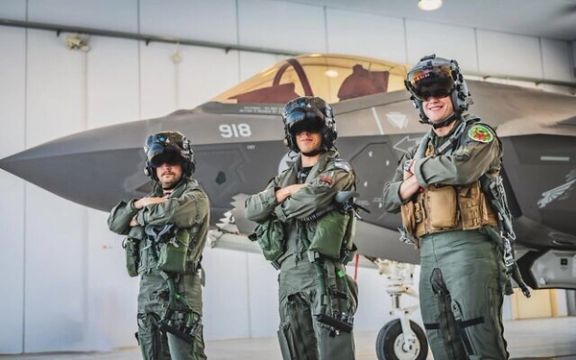
The Israel Air Force has held a drill to simulate an attack on Iran’s nuclear facilities with dozens of warplanes, as tensions remain high in the region.
According to an unsourced report by Israel’s public broadcaster Kan news on Tuesday, the classified military exercise was held some two weeks ago, with a US Air Force officer in attendance.
The drills that took place over the Mediterranean included various scenarios such as mid-air refueling, long-range strikes, and different responses to anti-aircraft missiles.
The Israelis touted the participation of a US official as an observer as evidence of a shift in Washington’s approach to Tehran’s nuclear program as the Vienna talks to revive the deal seem to falter.
Opposing the current nuclear talks between Iran and world powers, Israel has reiterated that it reserves the right to take military action to protect its citizens regardless of what happens in Vienna, with Prime Minister Naftali Bennett saying that “the campaign to weaken Iran” would be waged on a number of fronts.
During extensive military drills late in December, Iran simulated an attack against Israel's Dimona nuclear reactor.
Fars news agency, an affiliate of Iran’s Revolutionary Guard, published a video that shows a mock-up of the Israeli nuclear site -- marked as “WMD production center” -- as the target of the simulated operation.
Rhetoric has intensified between Iran and Israel as nuclear talks between have not reached any tangible results.
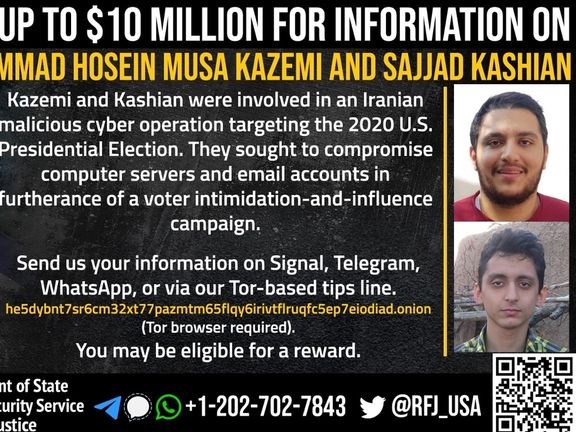
The United States has offered up to $10 million for information on two Iranian cyber actors for trying to influence and interfere with the 2020 presidential election.
The State Department’s Reward for Justice Program said in a statement on Tuesday that Mohammad-Hosein Musa-Kazemi and Sajjad Kashian sought to sow discord and undermine voters’ faith in the US electoral process.
The two contractors employed by Iranian cyber company Emennet Pasargad (formerly known as Eeleyanet Gostar) “participated in an Iranian state-sponsored, multi-phased online operation that attempted to interfere with the 2020 US presidential election” from at least August through November 2020, read the statement.
Kashian managed computer network infrastructure while Kazemi helped to carry out the campaign by compromising servers that were used to send the threatening voter emails, preparing emails for the voter threat email campaign, and compromising the email accounts of an American media company.
The cyber company provides cyber capabilities and support to Iran’s Intelligence Ministry Security as well as to the Islamic Revolutionary Guard Corps (IRGC) and the IRGC-Qods Force – both of which are designated Foreign Terrorist Organizations.
Both hackers face sanctions and federal criminal charges in connection with their activities, the statement added.
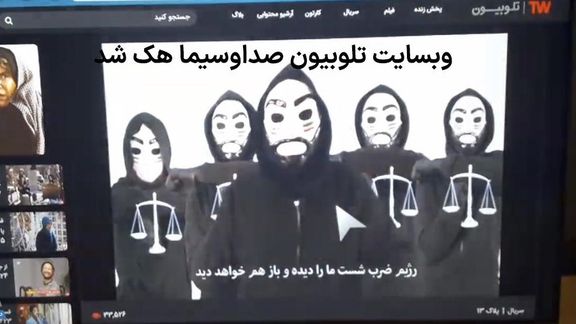
A website for the online streaming of Iran’s state television was hacked less than a week after another similar incident disrupted a few TV and radio channels.
Hacktivist group Edalat-e Ali (Ali's Justice) hacked the television website and broadcasted a video with a strong opposition message Tuesday afternoon.
The video started with footage of people in Tehran’s Azadi stadium shouting “death to dictator” referring to Supreme Leader Ali Kamenei, then it cut into a close up of a masked man similar to the protagonist of the movie V for Vendetta, who said “Khamenei is scared, the regime’s foundation is rattling”.
The voice in the one-minute video continued that the Islamic Republic cannot silence them as they plan to turn the ten-day celebration of the 1979 revolution into mourning for Islamic Republic.
The 10-day Dawn – also known as Fajr -- is an expression used by the authorities to refer to the ten-day period between Ruhollah Khomeini's return to Iran on February 1 and to the day revolutionaries gained victory against Bakhtiar's government, the last remnant of the Pahlavi rule.
The video labeled the revolution anniversary, which is celebrated by extravagant state-sponsored events across the country, as a 10-day period for nationwide protests.
The group also announced that they are against compulsory hijab in the country, while in the background footage from a campaign by Masih Alinejad against hijab was shown.
The voiceover added that the group will expose the crimes of the regime like it did before, referring to another hack by the group when they released videos from security cameras inside the Evin prison in August 2021.
Edalat-e Ali threatened the regime with more actions and ended its video with an audio clip of people shouting “Don’t be afraid, we’re all together” that is a slogan Iranian protesters chant when security forces attack to arrest them.
The hacking group has claimed responsibility for hacking several Iranian government entities in the past three years.
In their debut action in May 2018, the group hacked into systems at Mashhad international airport and posted anti-government messages and images on arrival and departure information screens.
The group claimed in July 2018 to have hacked the email accounts of Tehran municipality officials, and the email accounts of officials of state broadcaster (IRIB) in January 2019.
Earlier on Thursday, several television and radio channels − including Channel One, News Channel, and the Arabic-language Al-Alam, as well as Javan and Qur’an radio channels -- were hacked and briefly aired photos of leaders of Albania-based opposition Mujahideen-e Khalq (MEK) with audio footage from one of their speeches in the background.
Then the video showed a photo of Iran’s Supreme leader Ali Khamenei with a red cross on it, as an off-camera voice said, “Death to Khamenei.”
Following the attack, a MEK spokesman denied any knowledge of the apparent hacking, prompting speculations that the attack might have been an inside job by the employees of the state broadcaster.
Shahin Qobadi told Iran International TV that the group had become aware of the incident only when it happened but that the hacking might have been the work of supporters in Iran.
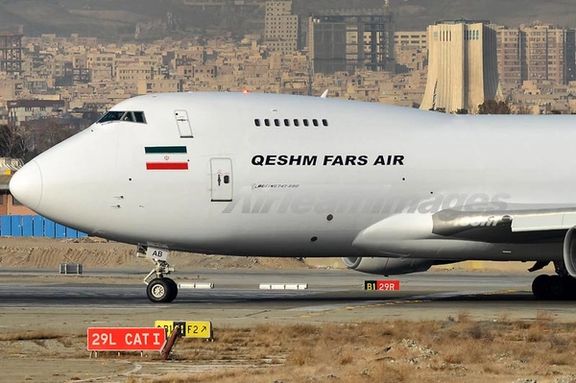
Iran has begun discussions with both China and Russia over new airports, ILNA (Iranian Labour News Agency) reported Tuesday, despite existing ones losing money.
Managing director of Iran’s Airports Company, Siavash Amirmokri, said that after preliminary studies and negotiations, Tehran would begin talks over technical matters including navigation systems. Giving a 20- to 25-year timescale, Amirmokri said there were no immediate plans for new airports.
The semi-official news agency ISNA said in a report November 2016 that only six of Iran’s 54 airports were profitable, up from three in 2013.
The former head of Civil Aviation Organization, Touraj Dehghani Zanganeh said in March 2021 that over 90 percent of flights were concentrated in only 10 airports, with over half of the traffic at Mehrabad airport, Tehran, and Mashhad International airport.
Internal air travel in Iran is relatively common due to the country’s size, although Iran has long struggled to replenish its ageing fleet in the face of international sanctions. The reputation of Russian-made Tupolevs, used for many internal flights, dived in the early 2000s with disasters in Iran and elsewhere.
The US imposition of ‘maximum pressure’ sanctions after 2018 derailed deals Iran had agreed with Boeing and Airbus to purchase dozens of planes after international sanctions were lifted following Iran’s 2015 Iran nuclear agreement with world powers.